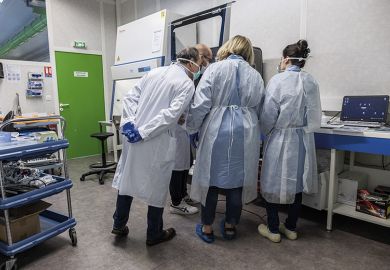Almost every student and academic across the world is having to adjust to a strange new work-home reality.
Coping with new and unexpected work demands while juggling caring commitments to parents, relatives and children will inevitably cause uncertainty and stress, meaning compromises will be required.
Without minimising these challenges, however, history shows that progress can happen because of such terrible and terrifying circumstances. In their book A Beautiful Constraint, Adam Morgan and Tony Barden detail countless instances where professionals with their backs against the wall prospered in adversity. In a lighter example, they describe how Mick Jagger’s distinctive dance style was developed initially because the Rolling Stones’ early gigs were played on stages too minuscule for their frontman to dance properly.
Like Jagger, many academics and students are now having to adjust to challenging and constraining work realities. For many, life feels difficult and uncontrollable. But we can draw on centuries of knowledge to work well.
In ancient Greece and Rome, the Stoics were used to navigating hazardous times. If you said the wrong thing or found yourself on the losing side of a political defeat, the consequences could be summative expulsion, imprisonment or even death. Even so, they lived by a vital insight.
This maxim is particularly true when it comes to the Covid-19 pandemic. Rather than worry about impending global doom, we must focus on slowing the virus’ spread by adhering to government recommendations on infection control and staying home when possible.
Maybe we should go further. Consider combating the urge to keep up with the minutiae of the pandemic’s progress by consciously managing information flow to you. Set clear boundaries by accessing social or mass media only two to three times each day. And turn off the notifications on your phone.
It is also vital to retain a clear sense of what personal success looks like during this period of change. Developing your own success indicators that express your personal values – what’s really important to you – will be important to remaining productive during this historic period. If you’re not clear what success looks like for you, it’s impossible to work towards that end.
With that sense of your values and success indicators, you are better placed to make choices about what to do – or how to prioritise. For example, neglecting caring for yourself and your loved ones to maintain your work goals may leave you with painful regrets.
Many of us are already experiencing guilt about prioritising ourselves and our families over work. However, prioritising care of yourself and the people who matter most to you may be the most beneficial thing you can do to support your work over the long term.
As we enter uncertainty and new patterns of work, it can be challenging to identify these priorities. So it is worth taking a step back to devote some time to deciding your three main daily, weekly and monthly priorities guided by your success indicators.
Even during this unprecedented period of challenge, your priorities are always choices about what your energy and efforts will focus on. Own them, be accountable for them and work to do the right things, even amid change and uncertainty.
This will not be easy. Prioritisation matters most in a crisis but is also most difficult. Distractions abound, our emotions are unsettled. It might be worth sharing your goals with an online accountability partner with whom you can compare success indicators and priorities.You can also share your challenges and accomplishments along the way, especially the small ones.
Amid the manifest challenges and the world’s pain and fear just now, we can always seek learning. What has this unexpected situation taught us about what’s really important to us in our work and in our life? What have responses revealed about the underlying strengths and weaknesses of you and your workplace? How do you most want to grow as an individual, and as part of a community?
Whatever happens, as the vast literature on the growth mindset teaches, we always retain control over whether we learn or not.
We don’t know what the immediate future holds, but we do know that there is already a vibrant international community of academics and students on social media helping each other through this. Whether via Times Higher Education’s Twitter feed or hashtags such as #academictwitter or #covidacademia, there has never been a better time for academics and postgraduate researchers to connect with and support each other.
Bailey Sousa is a director at the Peter Lougheed Leadership College at the University of Alberta, in Canada, where Alexander Clark is associate vice-president (research). Their book How to be a Happy Academic is published by Sage Publications.
Register to continue
Why register?
- Registration is free and only takes a moment
- Once registered, you can read 3 articles a month
- Sign up for our newsletter
Subscribe
Or subscribe for unlimited access to:
- Unlimited access to news, views, insights & reviews
- Digital editions
- Digital access to THE’s university and college rankings analysis
Already registered or a current subscriber?










